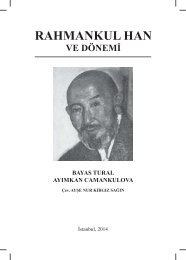THE SOVIET HISTORIOGRAPHY AND THE QUESTION OF KAZAKHSTAN’S HISTORY
SOVYET-TARIH-YAZICILIGI-ENG
SOVYET-TARIH-YAZICILIGI-ENG
Create successful ePaper yourself
Turn your PDF publications into a flip-book with our unique Google optimized e-Paper software.
<strong>THE</strong> <strong>QUESTION</strong> <strong>OF</strong> <strong>KAZAKHSTAN’S</strong> <strong>HISTORY</strong> 151<br />
Ivanova, and suggested to take under Russia’s nationality all Kazakhs<br />
living under khan’s control. This means that instead of using word<br />
auspices it was used word nationality. In 1731 Anna Ivanova send to<br />
Ebu’l Hayr Han a decree informing him that all Kazakhs living under<br />
his control are taken under Russia nationality. Muhammed Tevkelev<br />
was sent as a envoy to Ebu’l Hayr Han to formalize this decision. 253<br />
After meeting with Russia’s envoy Tevkelev, Ebu’l Hayr Han stated<br />
that he took the Russia’s decision of asking for auspices, but also<br />
stated that he didn’t take confirmation from other chieftains and<br />
sultans. In October 1831, all chieftains and sultans participated on<br />
Khan’s Council and they heavily criticize Ebu’l Hayr Khan’s decision<br />
of asking to participate to Russia which is taken by himself before<br />
asking council. The council as a result decided that “We want to live in<br />
peace with Russia but not under their nationality.” In the council only<br />
Ebu’l Hayr Han with three other persons near him accepted Russia’s<br />
auspices and they took an oath. 254<br />
This event that happened in process of annexation of Kazakhstan<br />
to Russia in publications in Soviet period constituted a base for Kazakhstan<br />
voluntarily participation to Russia. Russia’s establishment<br />
of fortification on north of Kazakh’s land in Turkestan, and therefore<br />
becoming neighbor to Kazakhs, Russian officers’ undertakings to take<br />
Kazakhs under Russia’s influence, Kazakhs’ fear of Dzungar, Ebu’l Hayr<br />
Han and few other Kazakh chieftains’ asking for Russia’s auspices and<br />
similar reasons does not mean that Kazakhs are voluntarily Russia’s<br />
community and part of state. Tsar Petro’s East policies should be<br />
remembered to understand that here Kazakhstan was not voluntarily<br />
annexed to Russia. Petro’s following words are helping us to understand<br />
Russia’s ambitions over Kazakhstan: “Kazakh is a gate and key<br />
to all Asia countries there. That’s why we should absolutely take them<br />
under Russia auspices” 255 Thus after Russian occupation they fought<br />
very much to protect their liberty and against Russian influence. Riots<br />
leaded by Syrym Batur, Jolaman Tilenshi, Isatay Tayman, Sultan<br />
Kenesari couldn’t be overlooked neither by Tsardom historians nor by<br />
Soviet historians. This struggles for liberty are showing that Russia’s<br />
annexation of Kazakhstan was not voluntarily participation, but it<br />
was a occupation.<br />
In the Soviet period in a name of building a Soviet nation histo-<br />
253 Hayit, B., Sovyetler Birliği’nde Türklüğün ve İslam’ın Bazı Meseleleri, İstanbul, 1987, pp.<br />
132-133.<br />
254 Ibid, p. 134.<br />
255 Hayit, B., Türkistan Devletlerinin Milli Mücadele Tarihi, Ankara, 1995, p. 49



